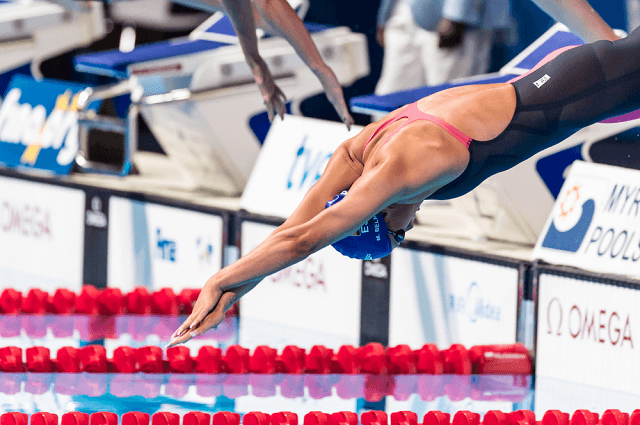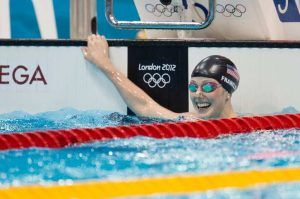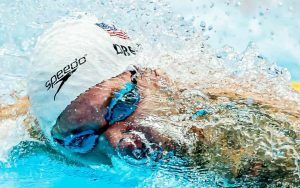Almost daily I receive an email from a subscriber of my newsletter asking me what to do when all motivation is lost, and the last thing they want to do is go to the pool and swim.
In this guide to motivating the demotivated swimmer I talk about 16 different strategies and techniques that not only have worked for me and other swimmers I have worked with in the past, but some of them are backed by research and space science.
Consider it your battle plan for the next time apathy and low levels of motivation strike.
And here we go!
1. Keep a log of personal records.
Everybody has best times, but not everybody keeps track of their PB’s for kick 100’s, pull 50’s, and their off-stroke distances. Keeping a little record of these, err, records is a fun way to challenge yourself on a daily basis, and give yourself that powerful and rewarding sensation of having done something you have never done before.
2. Strategically use rage and anger.
Love this one, simply because I have used it for as long as I can remember, knowing that I can always use it as a little pick-me-up if need be.
It could be thinking about that ex-boyfriend or girlfriend. Or that swim at nationals where you were out-touched by that swimmer on the cross-town team that you absolutely can’t stand. While living life as an angry dude or dudette is a recipe for an awful life, when you strategically use your anger and past experiences they can be extremely powerful. Don’t just take my word for it, even science says so.
Researchers in the United Kingdom performed a study where they found that when fired up people tended to not only exert the most energy when working out, but would also do it for longer than those who were chill and calm.
Things you can do to get yourself amped up include angry music, revisiting those regrettable and painful swims from your past, or simply visualizing someone you don’t like (see “The Waterboy” starring Adam Sandler if you need additional help with this technique).
I love this technique because it is unnatural to suppress emotion. We live in a time where we are expected to be Zen-like, calm and poised all the time. Once in a while though, it’s nice to let some of that pent-up rage go while also getting something accomplished. Whammy.
3. Use the thought of regret.
Guilt is a powerful thing. It is one of those feelings that feel like a stain on your shirt; no matter how much time passes or how many times you try to wash it out it’s always there.
Remind yourself that you have one opportunity in this life to do something amazing with your swimming, and every workout or main set you miss is an opportunity you can’t get back.
4. Don’t Break the Chain.
Most people would never think of Jerry Seinfeld as someone who would be a source of powerful life advice, but for someone who has been so successful for so long, it’s not so hard to believe. Seinfeld’s strategy for success? Do something every day.
For him, it was as simple as printing out a calendar, and then every day that he worked on his stand-up, he would draw a big “X” through the day. As the chain of X’s became longer, the more he obviously got done, but the harder it was for him to break the streak.
Every day doesn’t need to be a 5k for time, but what are you going to do today to improve yourself?
5. Have a Pre-Workout Routine.
Another one of my absolute favorite tools for getting my butt to the pool. There will always be those days where the last thing you want to do is head down to the aquatic complex and bang out a 6,000 meter workout. A pre-workout routine is used as a launch sequence of sorts, that once you start it, going to the pool and working out becomes inevitable.
The pre-workout routine is powerful because it is super sneaky—starting the little routine is really easy, and not intimidating. Not nearly as intimidating as walking out onto the pool deck, anyways.
So what should you include in your own pre-workout routine?
For me it’s doing some arm swings at home (or the office, whatever the case may be) to get some blood flowing, ingesting my pre-workout shake and snack (banana and a shake, every time), and listening to some aggressively loud music on my iPod.
And that’s it.
I’ve been doing this long enough that once I do these things my body automatically perks up, knowing that battle is coming.
6. Rate your workouts on a daily basis.
An easy little mental trick to help encourage you to swim better mid-workout is to rate your workouts after you have completed them. Either in your log book, a simple notebook or even a spreadsheet, write down the date of your workout and assign it a simple rating.
You can use the ranking scale of academia with A’s, B’s, and the loathed F. You can get more specific by using percentage points: 100%, 83%, 16% (ouch!). What I liked to use was a simple rating out of 10.
The nagging feeling that I would have to go home later that night and write out a 5 when I was capable of banging out a solid 7 or 8 was often enough to provide the little jolt to get my training session back on track.
(And no, I never scored a 10. The highest I have ever rated a workout was a 9.5. The ten is my white buffalo.)
7. Do one thing today you have never done before.
There are fewer things that inspire confidence like expanding your limits, by doing something that never in the history of your swimming you’ve ever completed.
Sometimes it comes in the form of beating a personal best time in practice, others it is doing a set that you never thought you’d ever be able to do (10×200 butterfly in the long course pool was one such set for yours truly).
That something you have never done doesn’t need to be a PB or a ridiculous fly set either. Never done five minutes of vertical kicking before? Do it. Never done a full 400m holding a stroke count of 15 per lap? Do it.
Turn those days your motivation is sagging into days where limits are broken, and new horizons are chased.
8. Design your environment for excellence.
You’ve surely heard that we are products of our environment.
While there is obviously a fair amount of choice still involved, it is difficult to dispute that our environment doesn’t have a fair amount of influence on our actions and behaviors.
Does your environment support your goals in swimming? Are you making it easier or tougher on yourself to make the decisions that will result in positive and forward-moving progress with your goals (and by extension– motivation)?
For example:
- If you find yourself staying up late watching television when you should be resting up for early morning workout, hide the remote and unplug the television.
- If you are eating junk food over the course of the day, pre-pack a healthy lunch the night before.
- If you are hanging out with people that encourage you to make poor decisions with your time and lifestyle, seek out friends who are more in line with your goals and aspirations.
By making it more difficult for you to engage in the stuff that is holding you back and demotivating you, you make the path to success, the path with the things that will push you towards your goals, the default option.
9. Imagine the feelings you’ll have after an awesome workout.
The awesomeness we feel after a successful workout is no joke.
Sure you may be exhausted, red-faced, and in a state of carb-deficit to the point that you could feint, but the endorphins and BDHT (a protein that is released into our brains when our body is stressed; it is what makes you feel clear-headed and focused after a great workout) leave you feeling mighty fine.
In those moments of struggle during a tough swim set, or in the minutes before that workout you are ruing, for a few seconds feel the pride and satisfaction that you will experience as a result of a killer workout.
10. Do something. Anything.
Okay, for this one I can see the problem…
If you don’t feel motivated, how can you possibly want to do anything? Well, I am going to tell you something you already know, even if it is only intuitively—action itself, no matter how large or small, is just as big a motivating factor as anything on this list.
How do I know that you already know this? Let’s take a trip down memory lane together.
Think back to the last time you had to do a workout which you truly did not want to do. Probably didn’t have to think back too far on that one, did we?
Anyways, despite your reluctance you got into the water and plowed ahead in spite of how you were feeling, and after a little while started getting into the workout to the point that you are surprised with yourself for having been so skittish beforehand.
Plunging ahead and acting is a powerful tonic for not feeling motivated.
Most swimmers will wait for motivation to come and strike them before they act. More often than not, it is the other way around. You act, do something, and then you end up getting motivated.
Bit of a trip, am I right? The key is to making the first step so small that it is impossible to say no to it.
Here’s an example of how I have convinced myself to go workout (and ultimately have a good session):
- I’ll just drive to the pool. No promises after that.
- I’ll get changed into my swim gear and do the dryland warm-up. If I don’t feel like swimming still I will leave.
- I’ll do the first couple reps on the main set, just to see how I feel.
The tiny commitments are easier to digest and far less intimidating than telling yourself, “You have to go the pool. You have to do your warm-up. You have to have the best workout of your life.”
When you let it sort of happen, moment by moment, it allows you to open yourself to becoming motivated.
11. Get in touch with your goals.
Goal setting for swimmers is important, especially if you have plans to achieve elite-level stuff. Having your long term goals nearby, written down, and loosely planned out gives you that added layer of purpose each day when you go to the pool.
But what happens when that isn’t enough to motivate you anymore? When you have your big goals, but they don’t push you like they used to? That when you think of them, you are more likely to sit back and think, “Yeah, well, obviously I didn’t really want to achieve that goal because look at how unmotivated I am right now”?
In those moments we have become separated and unglued from the meaning and purpose that our goals have for us.
Sit down with a piece of paper, and write your goal out on big block letters at the top. Underneath write out why you want to achieve this goal, and more importantly (and most powerfully), list out how achieving that goal will make you feel.
The feelings you will experience when you touch the wall, the elation and satisfaction of knowing that your hard work came to pass, and that you were able to crush countless obstacles en route to your goal.
12. Pick one thing to focus on today.
Believe it or not, there is such a thing as having too many goals. The problem with having a heap of things you want to accomplish is that you spread your energy in a hundred different directions, failing to put meaningful focus and effort onto any one goal.
Dial it back, and simplify. Pick just one thing to focus on today.
Simplifying and reducing the number of things you are fixating your energies on gives you a measure of control again (which in itself should get you going again), but when we go all in on one aspect of our training we begin to master it. And you and I both know that when we get better at something we feel pretty flippin’ good about ourselves.
13. Have a plan for those low motivation days.
Here is a great way to get proactive, anticipating those lowly days and having a plan in advance to deal with it. Build a low motivation checklist. 5 things you will do when you feel the motivation sag to the point that it makes you lose focus in the pool, lose desire to attend training sessions, and completely forget about your over-arching goals and dreams.
They don’t need to be massive things, in fact, the smaller and more digestible they are, the more likely you are to do them. Things like watch an inspirational YouTube video. Go for a walk with the parents and discuss goals. Choose a reward for a successful session of training. And so on.
Write out your little list, and keep it in a desk drawer for the next time you are having an off day mentally. Think of it as your emergency parachute, your plan B, your contingency plan, for those not-so-rad days.
14. Change things up.
Sometimes simply making a couple small adjustments to your usual routine can shake you out of the apathetic slump. It can be as simple as changing lanes (sometimes it is nice to get a break from your lanemates), to overhauling the way you warm up, even to which stroke you do during the main set.
Trying new things adds variety and spontaneity to your otherwise humdrum routine (for some it’s humdrum, for others it is what makes them successful) and will help keep you mentally engaged in what you are doing.
You can adopt this mindset within your training as well. Choose to focus on an off-stroke today, or make today the day you try six-beat kicking for an entire workout. When my freestyle and backstroke were just not clicking, and I was getting frustrated I would hop into the breaststroker’s lane and vicariously live the life of a breaststroker for a session.
15. Remember that the dips are natural.
Think back to the beginning of the year when you were riding high on ambition and your fresh new goals. With a clean slate, and a roster of new goals to accomplish this season, you were feeling mighty awesome about yourself and your swimming. Optimism abounded, and you felt like the world was yours for the taking.
But after a few weeks the novelty wore off, and that awesomeness began to fade, and one day you catch yourself demotivated, uninterested, and bored with the prospect of going to the pool. It’s in those moments that some athletes begin to take the drop in motivation personally. It’s hard to watch an athlete take a dip in motivation personally. To the point that because they don’t feel 100% into it that they should just scrub the entire workout.
This type of all-or-nothing thinking turns one bad workout into a streak of them really quickly. They cannot imagine why they feel so off, and berate themselves mentally for feeling as such. “See, obviously you don’t want this that bad.”
The train of nasty thoughts that start plowing through our minds at these moments can be paralyzing and heavily defeating. Instead of dumping all this negativity on yourself, take a step back and remind yourself that this is part of the process. Part of the struggle. Part of the journey.
It’s okay to feel this way, and not only is it kinda natural, but it will happen again at some point in the future.
16. Use self-talk.
Whether you know it or not, you are already using self-talk with just about everything you do in life. From congratulating yourself on completing a homework assignment, a tough set, or even the chores, to berating yourself when you bomb a test, miss a workout, or sleep in past your alarm.
Self-talk affects our moods (“See, I knew I couldn’t do it!” results in you feeling down on yourself, whereas, “See, I knew I could kill that set!” will make you feel uplifted and encouraged) and feelings, which drives our actions.
The reality is that you are already using it, so why not put this tool to use for some good in the water?
The way that our brain intertwines with our bodies may never be fully understood, but there is no doubt that there is some powerful stuff we can do with our noodles to improve performance in the pool. One such way is to use positive and encouraging self-talk in the moments where we are struggling or lacking in motivation.
According to research done at the University of Kent (that’s in England for you geography fans) where 24 active participants were asked to ride a stationary bike to the point of failure.
Those who incorporated various forms of positive self-talk (“I got this!” and “Feeling good!” were two) were able to pedal for longer than those who didn’t. Perhaps most notably, the riders who used the mantras reported the ride felt easier, meaning perceived exertion had gone down even though actual exertion and effort had remained the same.
When that big workout is looming over the horizon and the last thing you want to do is strap on a soggy Speedo, unleash a couple positive mantras on yourself for as long as it takes to get you warmed up and in the pool.
The Takeaway
All too often we feel like we are prisoners of our motivation levels. We sit around, waiting for it to hit us so that we can go and do the things we know we need to do in order to accomplish our goals.
Employ this little checklist in your daily battles with willpower and motivation. You can choose to be a more motivated athlete–all you got to do is take the first step.














